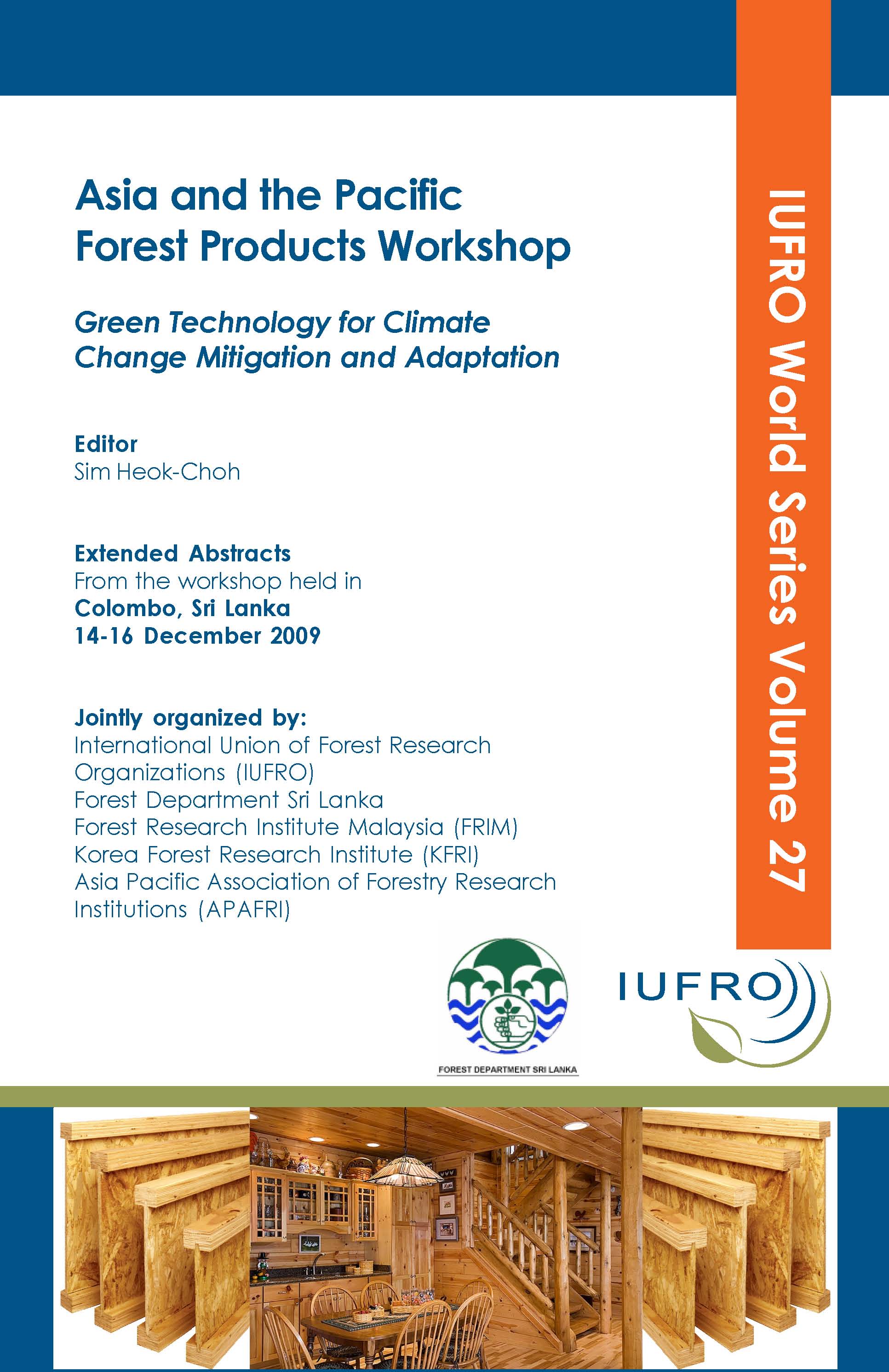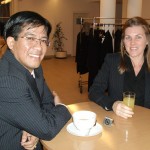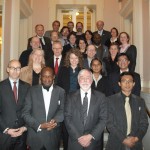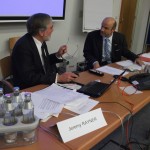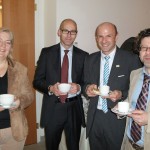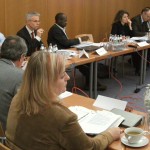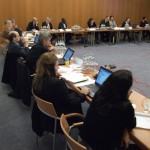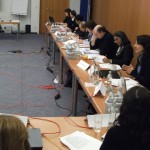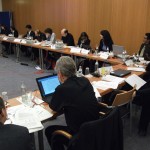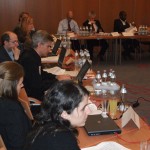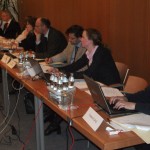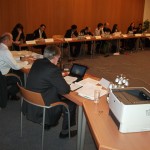IUFRO Spotlight #3: The Montesclaros Declaration
End trade in detrimental ornamentals to save forests
By Eckehard Brockerhoff, IUFRO Deputy Coordinator of Division 7
(SCION, New Zealand)
 In a provocative attempt to save the world’s forests, a group of 70-plus scientists from 17 countries are asking trade policy makers around the globe to phase out such international trade in high-risk plants that put forest health at high risk while offering limited economic benefit.
In a provocative attempt to save the world’s forests, a group of 70-plus scientists from 17 countries are asking trade policy makers around the globe to phase out such international trade in high-risk plants that put forest health at high risk while offering limited economic benefit.
If the scientists’ proposal is implemented, it would mean an end to all international trade in containerized ornamental plant seedlings and trees intended as plants for instant landscape planting. Read more…
IUFRO Spotlight #2: Traditional Forest-Related Knowledge
Traditional Forest-Related Knowledge: Sustaining Communities, Ecosystems and Biocultural Diversity
By Su See Lee, IUFRO Vice-President
(FRIM, Malaysia)
A new book invites forest scientists to think outside the box – or, perhaps outside the laboratory – and make more of an effort to incorporate elements of traditional knowledge in their research and forest management activities.
The book, Traditional Forest-Related Kno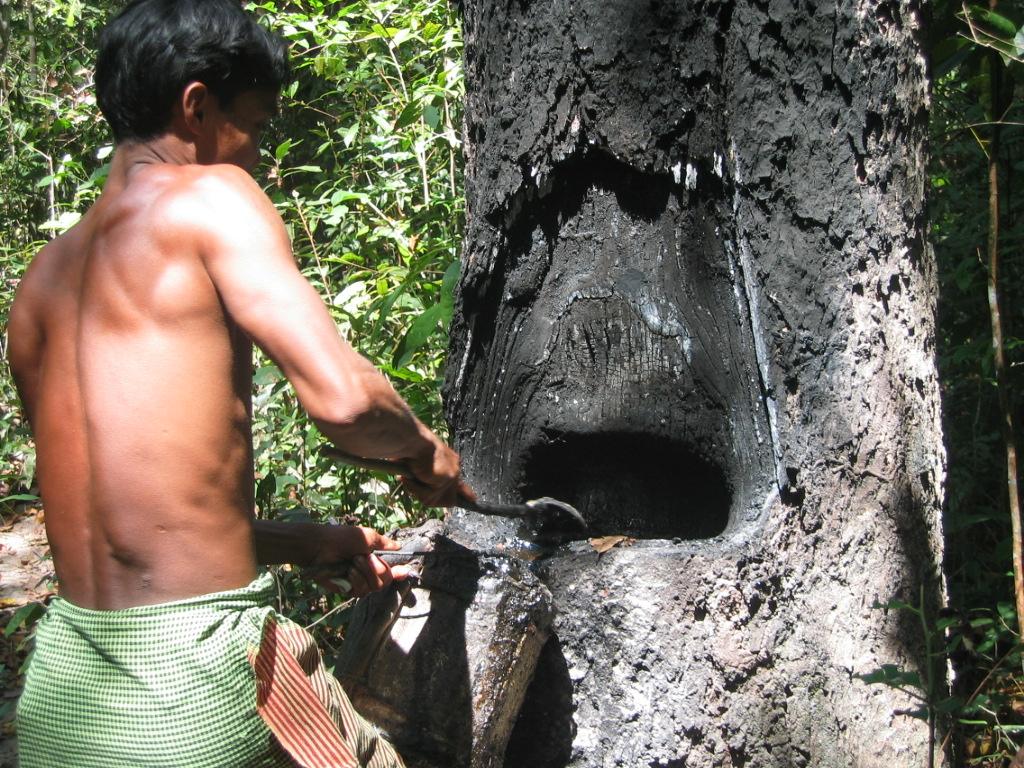 wledge: Sustaining Communities, Ecosystems and Biocultural Diversity, published by Springer just this month, takes a long look at the contribution traditional knowledge has made and continues to make to sustainable resource management around the world. Read more…
wledge: Sustaining Communities, Ecosystems and Biocultural Diversity, published by Springer just this month, takes a long look at the contribution traditional knowledge has made and continues to make to sustainable resource management around the world. Read more…
IUFRO Spotlight #1 – President’s Message
Forest research matters. All of us under the IUFRO umbrella know that.
Research is what we, in our member organizations, do. It is who we are.
By Niels Elers Koch, President, IUFRO
(Copenhagen University, Denmark)
In addition to increasing our understanding of the world in which we live, there can be – and often are – important policy implications for our research findings. And we know very well that good sustainable forest management decisions can only be made based on sound science.
For that reason, IUFRO is embarking on a new initiative called IUFRO Spotlight to introduce timely, significant forest research findings from our member organizations to a worldwide network of policy makers, other decision makers and researchers. Read more…
2 New Volumes of the IUFRO World Series
2 volumes of IUFRO’s World Series have just been newly published. The IUFRO World Series was designed to give IUFRO officeholders a possibility to make their expertise known to a larger public. In most cases, reports resulting from IUFRO meetings, IUFRO Task Force reports or results from the work of IUFRO Special Projects and Programmes are published in this series. The main focus is on original research devoted to specific themes either in the form of collected articles or as single extensive contributions.
—————————-
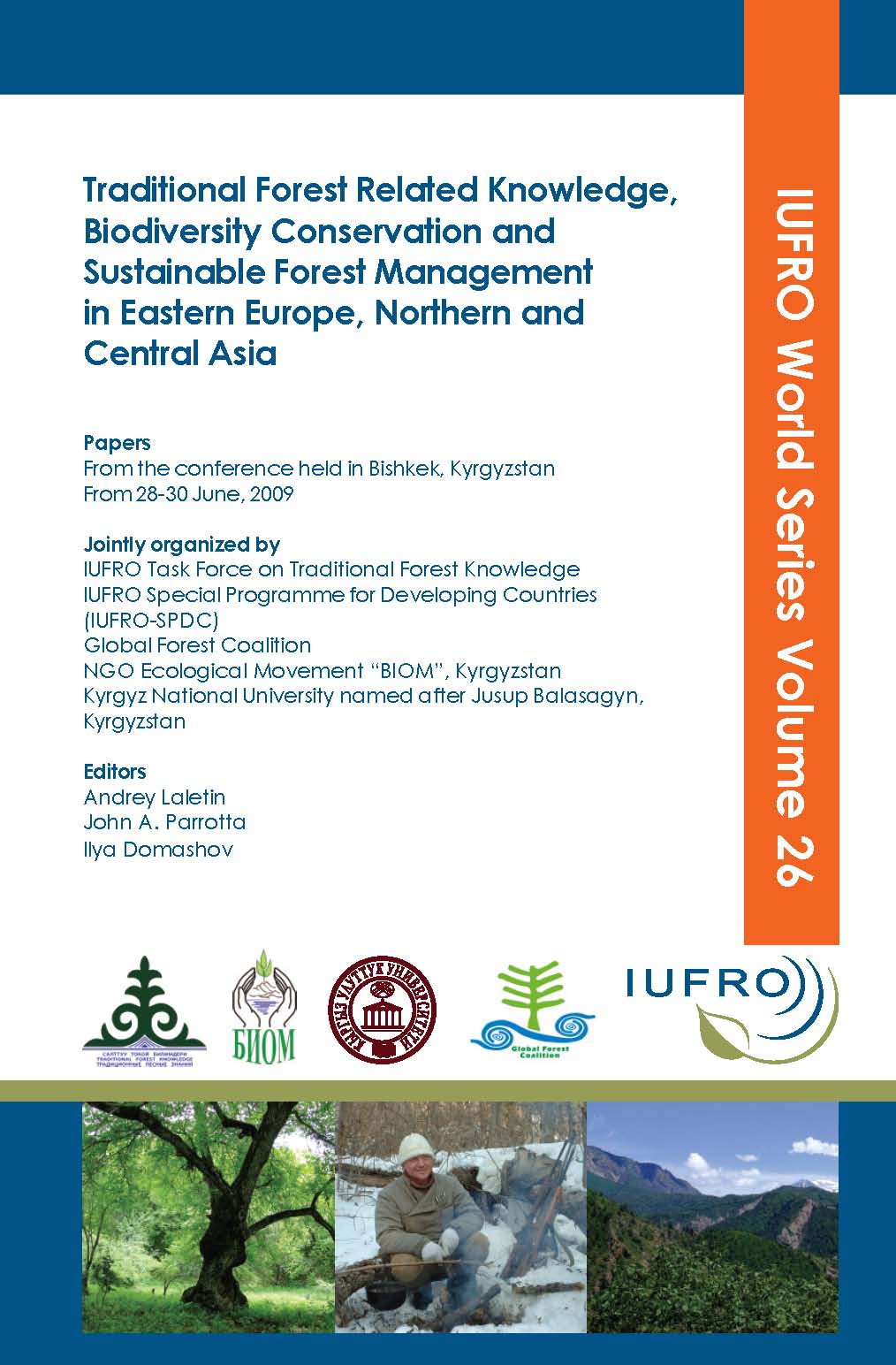 Volume 26: Traditional Forest Related Knowledge, Biodiversity Conservation and Sustainable Forest Management in Eastern Europe, Northern and Central Asia.
Volume 26: Traditional Forest Related Knowledge, Biodiversity Conservation and Sustainable Forest Management in Eastern Europe, Northern and Central Asia.
Andrey Laletin, John A. Parrotta, Ilya Domashov (editors). Vienna, 2011 – 78 p.
Forests and woodlands that are the traditional homes of local communities in Eastern Europe, Northern and Central Asia have historically been managed by these communities themselves, or more recently in collaboration with government agencies. Traditional forest-related knowledge (TFRK) and innovative forest management practices, developed over centuries, have contributed significantly to the natural and cultural heritage of the region, and sustained production of multiple goods and services that enhance livelihood security and quality of life for people. The conference provided a platform for sharing of information and exchanging experiences among scientists, the holders and users of traditional knowledge, non-governmental organizations, forest managers and other relevant stakeholders related to forest biodiversity and traditional forest-related knowledge. The conference highlighted the importance of traditional knowledge towards achieving the Millennium Development Goals, the objectives of the Rio Conventions, and its contributions to sustainable forest management.
For more information visit: http://www.iufro.org/publications/series/world-series/#c16553
—————————-
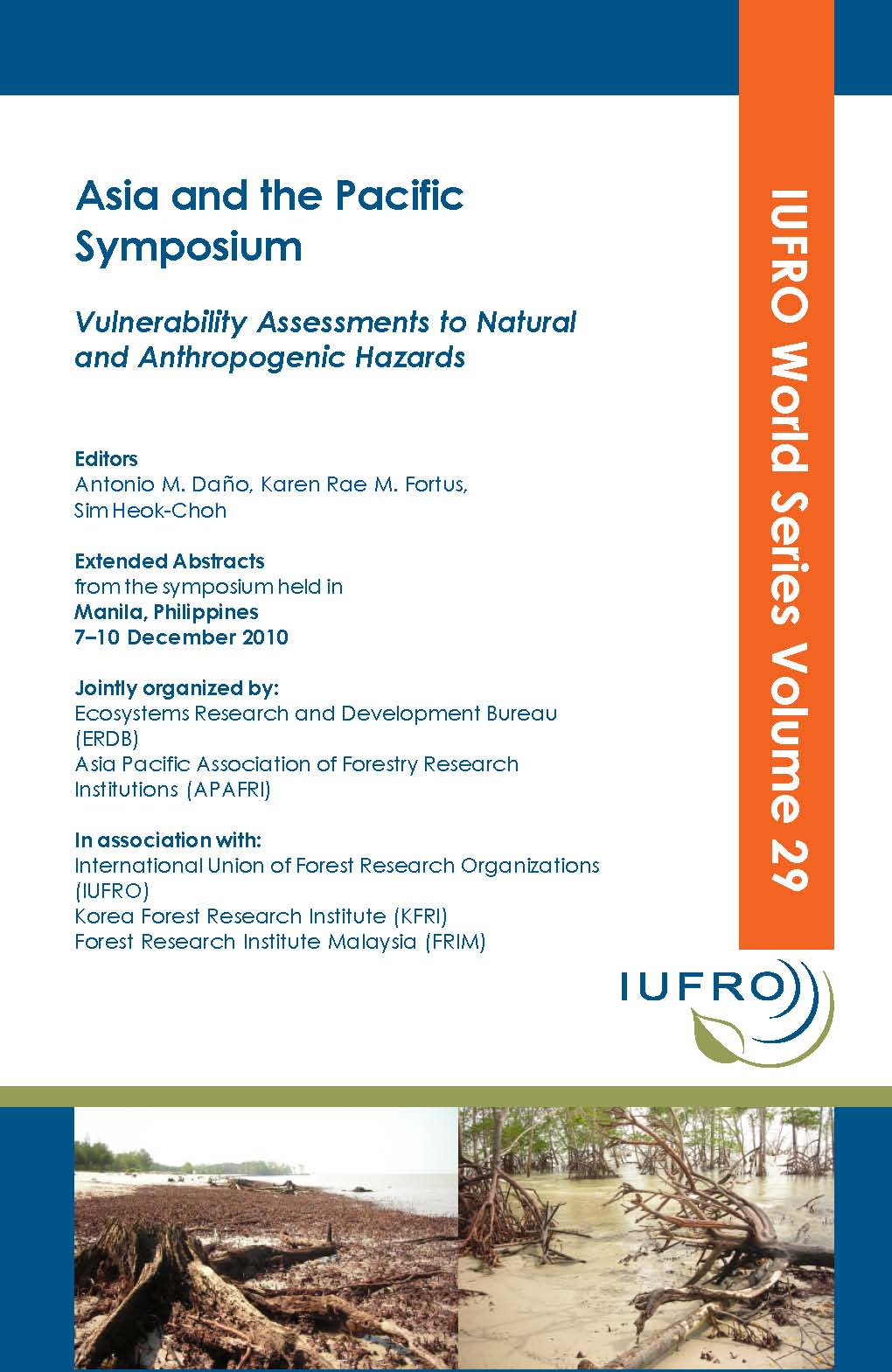 Volume 29: Asia and the Pacific Symposium – Vulnerability Assessments to Natural and Anthropogenic Hazards
Volume 29: Asia and the Pacific Symposium – Vulnerability Assessments to Natural and Anthropogenic Hazards
Editors: Antonio M. Daño, Karen Rae M. Fortus, Sim Heok-Choh. Kuala Lumpur, 2011 – 95 p.
In December 2010, a symposium was held in Manila, the Philippines, to lo0k at the vulnerability of ecosystems to natural and anthropogenic hazards and how best to assess it. The main objective of the symposium was to enhance the capability and capacity of participants in conducting vulnerability assessment of various ecosystems. It served as a venue for exchange of knowledge and initiatives in vulnerability assessment. The symposium was also expected to come up with output materials that will be useful in preparing appropriate programmes/projects to deal with the inherent biophysical and socioinstitutional characteristics of ecosystems and the stressors of the resources including the impacts of climate change.
Learn more about this publication at http://www.iufro.org/publications/series/world-series/#c18479
IUFRO Forest Governance Fact Sheet
PDF document for download
FOREST GOVERNANCE
The current set of international forest governance arrangements is best seen as a complex hybrid mix of international law, soft law, and non-governmental performance-based measures such as international certification schemes and industry codes of conduct. A diverse array of organizations and interest groups, all with different mandates, create the institutional environment for forest policy and governance. All of these actors are dedicated to supporting the different functions of forests, developing and implementing measures designed to protect the forest benefits, and interacting – often in a competitive manner – with each other for political and financial support at different levels. There are an increasing number of governance challenges, such as the demand for bioenergy and legally harvested and produced timber (e.g. EU Timber Regulation on banning illegal timber products from the EU market, to be applied in early 2013). There is clear evidence from research that complex forest problems require synergistic approaches involving a wide range of policy instruments. Read more…
Embracing Complexity: Meeting the Challenges of International Forest Governance
IUFRO World Series Vol. 28, Edited by: Jeremy Rayner, Alexander Buck, Pia Katila
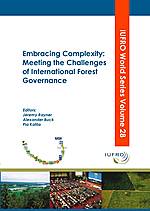
A new study assessing inter-national efforts to improve forest governance was issued together with a policy brief on 24 January 2011 by the Global Forest Expert Panel on International Forest Regime. It suggests among other things that global efforts have too often ignored local needs and failed to address the fact that deforestation is usually caused by economic pressures from outside the forests. The detailed results of the work of the expert panel, which was constituted under the Collaborative Partnership on Forests and coordinated by IUFRO, was presented to the Ninth Session of the United Nations Forum on Forests (UNFF) on 31 January 2011 as part of the launch of the International Year of Forests.
The report, the policy brief and a press release – New Study Suggests Global Pacts Like REDD Ignore Primary Causes of Destruction of Forests – are available for download.
Report and Policy Brief (English/French/Spanish): http://www.iufro.org/science/gfep/forest-regime-panel/report/
Press Release: http://www.iufro.org/science/gfep/media-information/gfep-ifr-assessment-press-release/
For more information about the Expert Panel on International Forest regime, please visit:
http://www.iufro.org/science/gfep/forest-regime-panel/
2 New IUFRO Publications
2 volumes of IUFRO’s World Series have just been newly published. The IUFRO World Series was designed to give IUFRO officeholders a possibility to make their expertise known to a larger public. In most cases, reports resulting from IUFRO meetings, IUFRO Task Force reports or results from the work of IUFRO Special Projects and Programmes are published in this series. The main focus is on original research devoted to specific themes either in the form of collected articles or as single extensive contributions.
—————————-
Volume 25: Forests and Society – Responding to Global Drivers of Change
IUFRO Special Project World Forests, Society and Environment IUFRO-WFSE
Many of the world’s forests and forestry are undergoing far reaching changes. An increasing number of global, complex, interacting environmental and socio-economic drivers of change affect forests and society. This book focuses on identifying the main global drivers of change and their direct and indirect effects on forests, forestry and forest dependent people. It proposes ways to reduce the adverse effects of these drivers and to take advantage of the benefits and opportunities they might bring.
To learn more about this publication, visit: http://www.iufro.org/science/special/wfse/
Climate change is a global problem, with global causes and effects. Climate change affects the basic elements of life for people around the world – access to water, food production, health, and the environment. Hundreds of millions of people will potentially suffer from hunger, water shortages, and more frequent severe natural disaster such as droughts, typhoons and floods, as the climate changes. Addressing climate change and dealing with the impacts requires urgent efforts by all.
The main objective of the workshop was to provide a forum for linking various international, regional and national agencies and institutions dealing with climate change issues in forest products processing and utilization, and to share strategies, experiences and knowledge, related to green forest products technology.
For more information, visit: http://www.iufro.org/publications/series/world-series/#c16554
Big step towards completing the most comprehensive assessment to date of the international forest regime
 The assessment report is prepared by an Expert Panel on “international forest regime“, which consists of internationally recognized scientific experts in their field and is overall coordinated by the IUFRO-led initiative “Global Forest Expert Panels” (GFEP) of the Collaborative Partnership on Forests (CPF).
The assessment report is prepared by an Expert Panel on “international forest regime“, which consists of internationally recognized scientific experts in their field and is overall coordinated by the IUFRO-led initiative “Global Forest Expert Panels” (GFEP) of the Collaborative Partnership on Forests (CPF).
As part of the assessment process, the second meeting of the Expert Panel on the International Forest Regime was held on 7-8 July 2010 at the Headquarters of the United Nations Environment Programme in Nairobi, Kenya. 30 renowned experts in political science and international law gathered at this meeting to discuss the draft manuscripts of the assessment report and identify the conclusions emerging from the assessment.
Prior to the Nairobi meeting, all draft manuscripts of the report had been reviewed and commented in detail by 25 invited reviewers as well as this GFEP assessment was already initiated in October 2009 on the issue of the “international forest regime“.
The experts who gathered in Nairobi agreed on the idea of “embracing complexity” as the main storyline of the report and highlighted the potential for positive interactions between key elements of the international forest regime on issues such as reducing emissions from deforestation and forest degradation, access and benefit sharing, and forest law enforcement, governance and trade.
The assessment will be completed in autumn 2010. It will provide concrete proposals for better coordination and better outcomes of the international forest regime and is expected to make a major contribution to the International Year of Forests 2011. Listen to the podcast: Interview with Alexander Buck (GFEP Coordinator) for more information:
Expert Panel on International Forest Regime (GFEP)
25 political scientists met in Vienna last week to start drafting the most comprehensive scientific report on the international forest regime. The report will be officially published in January 2011 on the occasion of the 9th session of the United Nations Forum on Forests.
More specifically, the assessment aims to contribute to
- the international forest deliberations and international forest-related processes such as the ninth session of the United Nations Forum on Forests (January 2011), the tenth Conference of the Parties of the Convention on Biological Diversity (October 2010), and the discussion on Reducing Emissions from Deforestation and Forest Degradation (REDD);
- the improvement of coordination among political actors, policy instruments and institutions;
- the International Year of Forests 2011 by raising awareness about the role of international instruments and institutions affecting forests.
PHOTOS FROM THE FIRST MEETING

